Alisa Weilerstein, cello
Fragments
ALISA WEILERSTEIN, cello
Ruth Bader Ginsburg Memorial Recital
Lauded for her deep musical insight, technical brilliance, and creative authority, Washington Performing Arts friend and MacArthur “Genius” Award recipient Alisa Weilerstein returns with her innovative, theatrical new project Fragments. Weilerstein conceived of and has collaborated with 27 composers representing nine nationalities and varied musical styles to create a unique arc that intersperses movements of Bach cello suites with 10-minute fragments of newly commissioned works. This 7:30 p.m. D.C.-premiere performance features a mix of Bach and 18 short movements from works by Alan Fletcher, Ana Sokolović, Caroline Shaw, Daniel Kidane, Gity Razaz and Johann Sebastian Bach. The earlier 4:00 p.m. recital features a different mix of composer fragments for a world-premiere performance.
The New York Times writes, “This project is intended to reimagine what a cello recital can be, to challenge some of the conventions that Weilerstein thinks might inhibit a listener’s immediate response to the music, and to add layers of theatricality to the arguably staid traditions of the concert hall, in an acceptance that a musician is, after all, performing on a stage.”
Washington Performing Arts is a co-commissioner of Fragments. The 7:30 p.m. performance is the second-annual Ruth Bader Ginsburg Memorial Recital—an annual Washington Performing Arts’s performance to honor a dear friend of Washington Performing Arts, elevating new work of both established and renowned artists.
Due to the nature of the performance, there is absolutely no late seating.
This performance is 60 minutes, no intermission.
Washington Performing Arts is committed to ensuring visitors of all abilities can experience the performances and programs we present. We partner with our venues to ensure accommodations are available. For specific questions about accessibility at our Kennedy Center events, please visit https://www.kennedy-center.org/visit/accessibility or contact us at patronservices@washingtonperformingarts.org.
Meet the Artists
Alisa Weilerstein is one of the foremost cellists of our time. Known for her consummate artistry, emotional investment, and rare interpretive depth, she was recognized with a MacArthur “genius grant” Fellowship in 2011. Today her career is truly global in scope, taking her to the most prestigious international venues for solo recitals, chamber concerts and concerto collaborations.
Weilerstein regularly appears alongside today’s preeminent conductors with the major orchestras of the U.S., Europe, and Asia. Versatile across the cello repertoire’s full breadth, she is a leading exponent of its greatest classics and an ardent proponent of contemporary music, for whom Pascal Dusapin, Osvaldo Golijov, Gabriela Ortiz, Matthias Pintscher, and Joan Tower have all written new concertos. With her multi-season solo project, FRAGMENTS, Weilerstein aims to reimagine the concert experience. This immersive, visceral six-program series sees her weave together the 36 movements of Bach’s solo cello suites with 27 new commissions. She premiered the first two programs in Toronto in 2023, with subsequent performances in Tanglewood, Santa Barbara, San Diego, Cleveland and at New York’s Carnegie Hall. This season she performs them at Boston’s Sanders Theatre, the Maison symphonique de Montréal, La Jolla’s Conrad Prebys Performing Arts Center, and Los Angeles’s Walt Disney Concert Hall, before premiering FRAGMENTS 4 at the Kennedy Center in Washington, D.C., and touring all six programs in seasons to come. An authority on Bach’s music for unaccompanied cello, Weilerstein has released a best-selling recording of his solo suites and deconstructed his G-major Prelude in a video viewed more than 2.2 million times. Her discography also includes chart-topping albums and the winner of BBC Music’s “Recording of the Year” award.
Elkhanah Pulitzer is a highly esteemed opera director known for her bold, nuanced stage direction that explores the intersection of music and theater through innovation and hybridized forms, creating compelling and visually stunning productions. Recent projects include directing John Adams’ Antony and Cleopatra, which premiered at San Francisco Opera in September 2022 and will be presented next by Barcelona’s Liceu Opera in October 2023. Additionally this season, she collaborates with Alisa Weilerstein on Fragments, a groundbreaking, multi-year project for solo cello that weaves together the 36 movements of Bach’s solo cello suites with 27 newly commissioned works; and tours Europe with her production of David Lang’s prisoner of the state—which was premiered by the New York Philharmonic in 2020 and was subsequently performed by BBC Symphony Orchestra at the Barbican.
Past projects also include a live tour of Esperanza Spalding’s album 12 Little Spells; and DIORAMA, an art installation at the I.O.U. in San Francisco. Ms. Pulitzer has directed projects with the Los Angeles Philharmonic including John Adams’ Nixon in China and Leonard Bernstein’s Mass, the latter of which was also staged at the Mostly Mozart Festival at Lincoln Center. She has also directed John Adams’ The Gospel According to the Other Mary at the San Francisco Symphony, and Lucia di Lammermoor and Judas Maccabaeus at Los Angeles Opera.
Ms. Pulitzer directed Wagner’s Flying Dutchman at San Francisco Opera in 2013 and returned to serve as Artistic Curator of SF Opera Lab, an experimental chamber opera two-year program from 2015-17, where she developed the mission, brand, and programming. She has directed multiple productions at West Edge Opera, among them Alban Berg’s Lulu, Thomas Ades’ Powder Her Face, and Luca Francesconi’s Quartett. She has collaborated on next-generation projects with Washington National Opera, Lyric Opera of Kansas City, Boston Lyric Opera, Opera Omaha, Opera Theater of Saint Louis, and the Canadian Opera Company. Theater directing credits include work with Impact Theater, Cutting Ball, Riverside Theater, and Ensemble Theater Company.
Ms. Pulitzer was honored with the Opera America Success Award for her libretto Dream of the Pacific, an opera composed by Stephen Mager, commissioned and performed by Opera Theatre of St. Louis. She holds an MA from Columbia in Directing. Born in Boston and raised in St. Louis and Marin, Ms. Pulitzer also serves as board vice president of the Pulitzer Arts Foundation, which advances experimentation in art curation, installation and live programming.
Seth Reiser is a New York based designer who works in theatre, opera, dance, and music. Seth’s work has been seen throughout the United States and internationally. Recent work in music includes Handel’s Aci Galatea é Polifemo with the Philharmonia Baroque Opera in San Francisco directed by Christopher Alden; Henze’s El Cimarrón at Festival Impulso in Mexico City directed by Robert Castro; the set and lighting design for Bernstein’s MASS at the Los Angeles Philharmonic and the Mostly Mozart Festival at Lincoln Center, directed by Elkhanah Pulitzer; Johann Sebastian Bach’s Matthew Passion with the Berlin Philharmonic at the Park Avenue Armory directed by Peter Sellars; Claude Vivier’s Kopernicus at Theatre Cardin in Paris, directed by Peter Sellars; John Adam’s Gospel According to the Other Mary at the San Francisco Symphony directed by Elkhanah Pulitzer; Sufjan Stevens’s Round Up at the Brooklyn Academy of Music; Messiaen’s Des Canyon Aux Etoiles with the St. Louis Symphony, directed by Deb O’Grady, which was seen throughout the United States, at the Sydney Opera House and the Barbican; and The Indian Queen in concert with MusicAeterna, directed by Robert Castro which toured Germany. Reiser also regularly designs lighting for SF Symphony’s Sound Box concerts. He received his bachelor’s degree from Ohio Wesleyan University and his Master of Fine Arts from the Tisch School of the Arts at New York University.
Molly Irelan is a Los Angeles based Costume Designer. She prides herself on a holistic approach to her work and is formally trained in the history and construction of garments and costume design. Molly holds a bachelor’s degree in Costume History and Design from the University of Redlands (2010), an associate degree in Fashion Design from the Art Institute of Portland (2012), and a Master’s in Costume Design from the University of California – Los Angeles (UCLA) (2016). Molly has designed operas Elixir D’Amour (2017); Il Due Figaro (2018); and Cold Mountain (2019) at the Music Academy of the West in Santa Barbara, Amadigi (2016), Orphée (2020) at UCLA, Rev 23 (2020) at Prototype Festival, and the Pulitzer prize winning p r i s m (2018) in Los Angeles, New York, Sao Paolo Brazil, and the Kennedy Center. For screen Molly designed the opera miniseries desert in (2021) and feature Mirror Flores (2021). In 2022 she designed La Clemenza di Tito at The San Francisco Conservatory of Music; The Tragedy of Carmen at Velaa Island in the Maldives; The Central Park Five at Long Beach Opera; Onegin at Music Academy of the West; and Il Due Figaro at The Handel and Haydn Society in Boston. Most recently, Molly designed the world premiere of Kate Soper’s The Romance of the Rose (2023) as well as The Feast (2023), a collaboration between Long Beach Opera and Martha Graham Dance Company.
Artistic producer and consultant Hanako Yamaguchi believes in the transformative power of the arts. In addition to producing FRAGMENTS, a special project conceived of and performed by cellist Alisa Weilerstein, she has also recently served as artistic advisor to the Celebrity Series of Boston, WQXR’s Artist Propulsion Lab, Orchestra of St. Luke’s and Little Island (NYC).
Over her thirty-year tenure at Lincoln Center for the Performing Arts, Hanako emerged as a key leader in Lincoln Center’s evolution from classical music presenter to commissioner and producer of multidisciplinary presentations, involving music, dance, theater, film, and the spoken word. As Director of Music Programming, Hanako was a co-creator of the White Light Festival, a force behind the revitalization of the Mostly Mozart Festival, and curator/ producer of the long-standing Great Performers concert series. Throughout, her cultivation and advocacy of a wide range of artists, her desire for new collaborations, and her commitment to making the performances unforgettable have been her signature.
She is currently a board member of the International Society for the Performing Arts (ISPA), a global association of arts management leaders, who come together with the shared goal of strengthening and developing the arts internationally.
Program Notes
A Note from Alisa Weilerstein
In early December of 2020, during yet another of what seemed to be endless lockdowns due to the COVID-19 pandemic, I started scribbling ideas down on paper, anticipating a time when we would be able to reconvene with one another in the concert hall. I knew I wanted to create a visceral, emotional, and personal concert experience that would embrace the world we live in without sacrificing the intellectual aesthetic qualities that make our artform—concert music—such a singular mode of human expression and communication. I also was searching for a way to strip away our own natural instincts to categorize and contextualize everything we hear and see. I thought, what would our experience of music be like if we could be given the chance to simply listen first?
The entire FRAGMENTS project integrates all of Bach’s cello suites with 27 new commissions in original multi-sensory productions, to make six programs, each an hour long for solo cello. Every program, or fragment, is played without pauses and the program details are distributed after the performance.
The composers who have been commissioned to write for FRAGMENTS are diverse with respect to compositional approach, race, gender, age, nationality and ethnic background. There is also an even mix of well-known voices and young composers or composers whose work has heretofore not been adequately appreciated by the wider public. I asked all the composers to write multi-movement pieces for solo cello and to kindly grant me permission to insert the movements at different points throughout the program. That being said, FRAGMENTS is not a project about people who write music but rather about the music they write. The context and narrative in the sense that we are used to in our artform are far less important than listening to how these disparate voices interact with one another and create an entirely original, unified whole.
Although FRAGMENTS began as a flickering of thoughts and images, it has become something much greater. The remarkable group of artists with whom I am collaborating on this project and their joyful and thoughtful enthusiasm has been nothing short of inspirational to me. At its core, FRAGMENTS is about deep connection; links between disparate compositional voices, between concert music and theater, and most importantly, between audience and performer. I invite you to embark upon this adventure with us.
A Note from the Director
FRAGMENTS suggests various stages in life, emotional landscapes, drifts into memory, structural interplay between musical colors and their associative powers, and much more. Music by twenty-seven living composers woven with Bach’s cello suites merge old and new to create infinite possibilities. This approach of combining unique voices into a tapestry is what lies at the heart of this multi-year project. The ability to hear each voice while also seeing how it connects and responds to others is what shifts FRAGMENTS from a series of distinct solo works to one of musical voices in community, creating a continuum from the past to our present moment to effect new meaning.
The design of FRAGMENTS elevates the senses to provide an opportunity to go deeper into the music. Each fragment is framed within a unique installation borne of an emotional and architectural response to the musical arc Alisa curates and performs. The lighting within each fragment amplifies the music, while the scenic elements frame Alisa to awaken a new space within the familiar hall. The overall effect is that Alisa in performance and the hall itself take on an enlivened hue enhancing our overall experience and exciting our senses towards deeper listening to her extraordinary playing.
This invitation to embark on a musical journey of old and new is intentionally without hierarchy or narrative. History, biography, a sense of place and timeline fall away to celebrate the primacy of varying musical voices in dialogue. Sound paints on our soul a picture that conveys human truths beyond words, and our aim with each fragment is to illuminate and embrace the music Alisa performs towards a more profound connection.
In early December of 2020, during yet another of what seemed to be endless lockdowns due to the COVID-19 pandemic, I started scribbling ideas down on paper, anticipating a time when we would be able to reconvene with one another in the concert hall. I knew I wanted to create a visceral, emotional, and personal concert experience that would embrace the world we live in without sacrificing the intellectual aesthetic qualities that make our artform—concert music—such a singular mode of human expression and communication. I also was searching for a way to strip away our own natural instincts to categorize and contextualize everything we hear and see. I thought, what would our experience of music be like if we could be given the chance to simply listen first?
The entire FRAGMENTS project integrates all of Bach’s cello suites with 27 new commissions in original multi-sensory productions, to make six programs, each an hour long for solo cello. Every program, or fragment, is played without pauses and the program details are distributed after the performance.
The composers who have been commissioned to write for FRAGMENTS are diverse with respect to compositional approach, race, gender, age, nationality and ethnic background. There is also an even mix of well-known voices and young composers or composers whose work has heretofore not been adequately appreciated by the wider public. I asked all the composers to write multi-movement pieces for solo cello and to kindly grant me permission to insert the movements at different points throughout the program. That being said, FRAGMENTS is not a project about people who write music but rather about the music they write. The context and narrative in the sense that we are used to in our artform are far less important than listening to how these disparate voices interact with one another and create an entirely original, unified whole.
Although FRAGMENTS began as a flickering of thoughts and images, it has become something much greater. The remarkable group of artists with whom I am collaborating on this project and their joyful and thoughtful enthusiasm has been nothing short of inspirational to me. At its core, FRAGMENTS is about deep connection; links between disparate compositional voices, between concert music and theater, and most importantly, between audience and performer. I invite you to embark upon this adventure with us.
FRAGMENTS suggests various stages in life, emotional landscapes, drifts into memory, structural interplay between musical colors and their associative powers, and much more. Music by twenty-seven living composers woven with Bach’s cello suites merge old and new to create infinite possibilities. This approach of combining unique voices into a tapestry is what lies at the heart of this multi-year project. The ability to hear each voice while also seeing how it connects and responds to others is what shifts FRAGMENTS from a series of distinct solo works to one of musical voices in community, creating a continuum from the past to our present moment to effect new meaning.
The design of FRAGMENTS elevates the senses to provide an opportunity to go deeper into the music. Each fragment is framed within a unique installation borne of an emotional and architectural response to the musical arc Alisa curates and performs. The lighting within each fragment amplifies the music, while the scenic elements frame Alisa to awaken a new space within the familiar hall. The overall effect is that Alisa in performance and the hall itself take on an enlivened hue enhancing our overall experience and exciting our senses towards deeper listening to her extraordinary playing.
This invitation to embark on a musical journey of old and new is intentionally without hierarchy or narrative. History, biography, a sense of place and timeline fall away to celebrate the primacy of varying musical voices in dialogue. Sound paints on our soul a picture that conveys human truths beyond words, and our aim with each fragment is to illuminate and embrace the music Alisa performs towards a more profound connection.
“…The result of her reflections shines with uncommon ambition, so much so that it is hard to think of many soloists of a similar stature who would dare to bring anything like it to the stage.”
– The New York Times
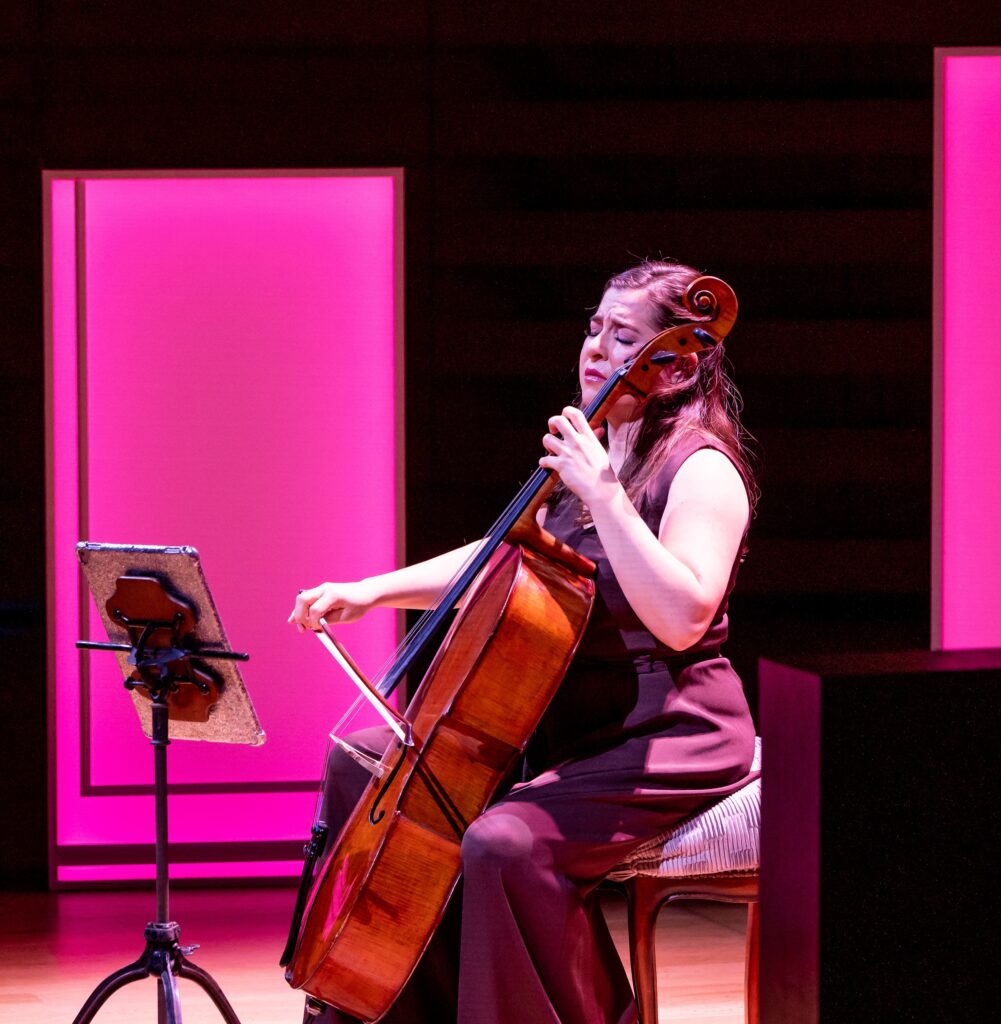
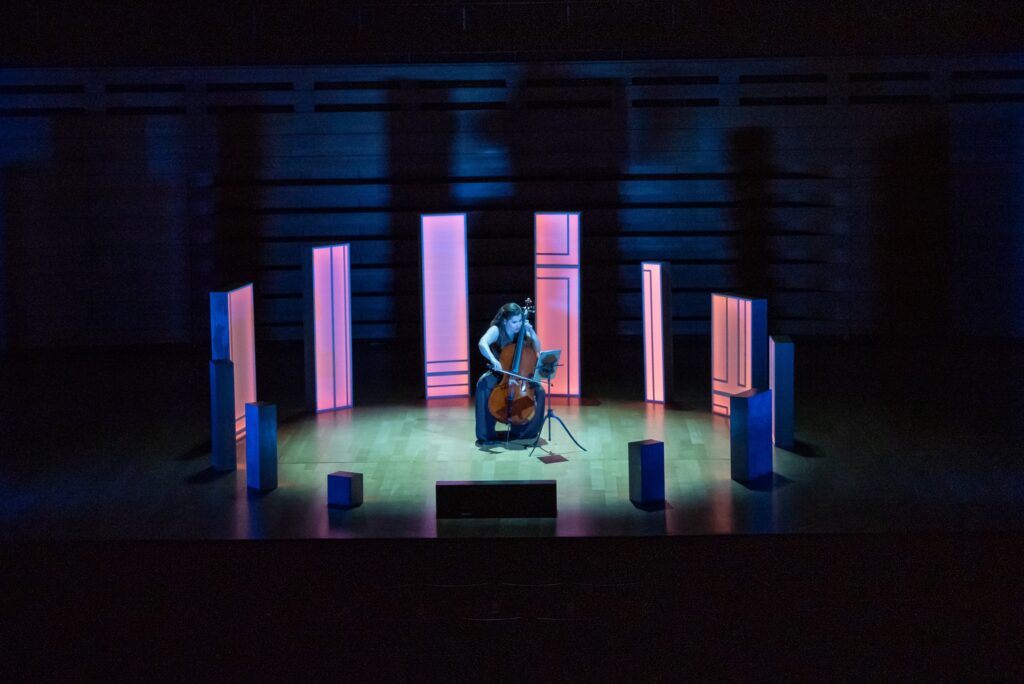
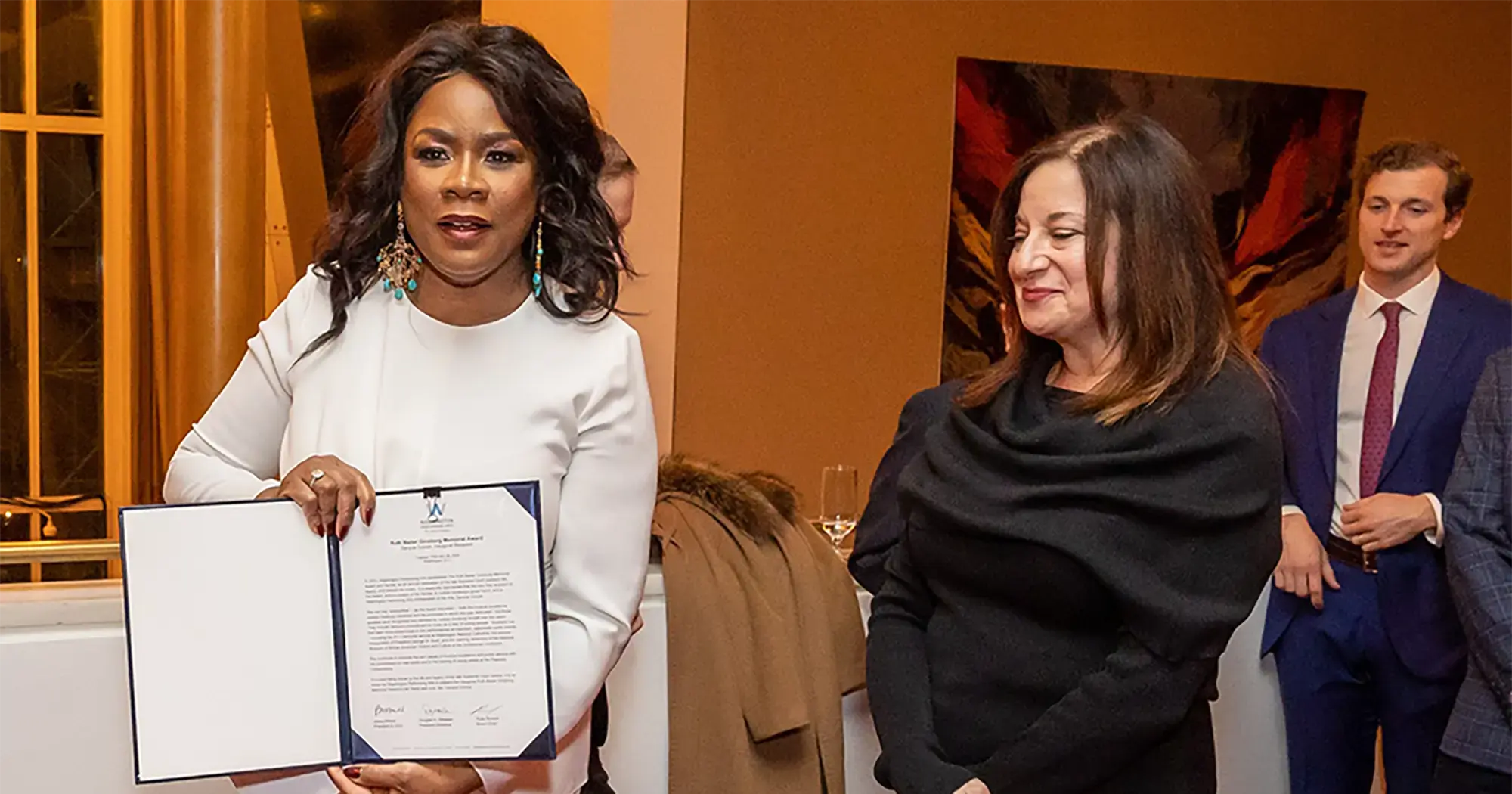
Ruth Bader Ginsburg Memorial Recital & Award
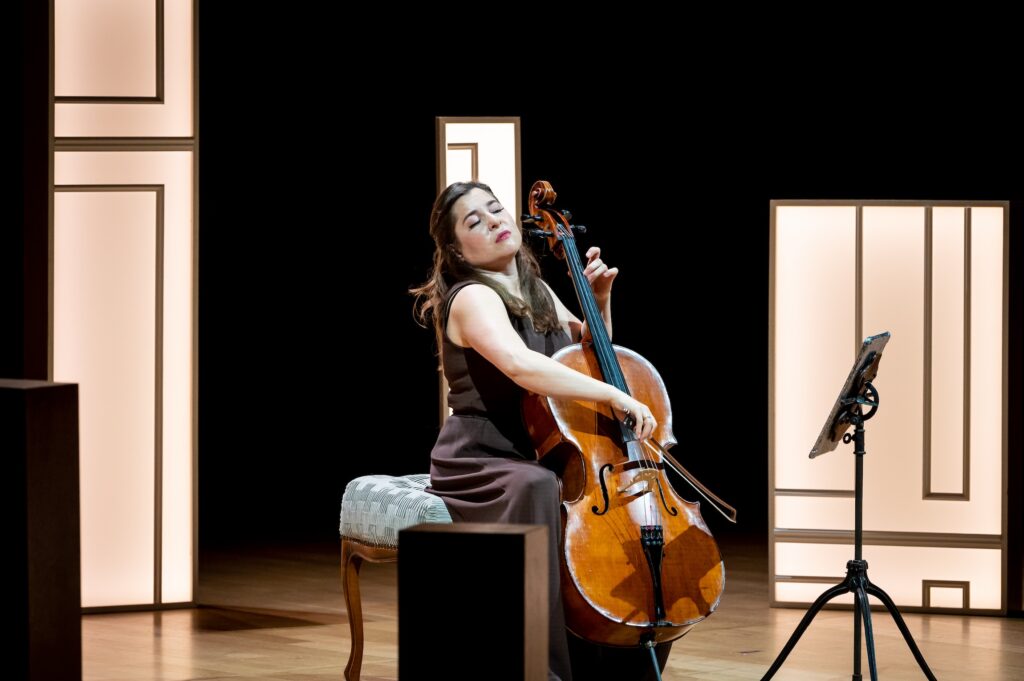
Alisa Weilerstein, cello
Fragments
Saturday, April 6, 4:00 p.m.
Kennedy Center Terrace Theater
Lauded for her deep musical insight, technical brilliance, and creative authority, Alisa Weilerstein returns with her innovative, theatrical new project Fragments. Weilerstein conceived of and has collaborated with 27 composers representing nine nationalities and varied musical styles to create a unique arc that intersperses movements of Bach cello suites with 10-minute fragments of newly commissioned works.
Our Partners
This performance is made possible through the generous support of the following sponsors: Mr. and Mrs. Michael Sonnenreich, Philip R. West and Barbara Yellen, Dallas Morse Coors Foundation for the Performing Arts, and The Randy Hostetler Living Room Music Fund.
Washington Performing Arts’s classical music performances this season are made possible in part through the generous support of Betsy and Robert Feinberg.
Washington Performing Arts also thanks the dozens of donors to the Ruth Bader Ginsburg Memorial Award and Recital Fund who helped make this concert possible.
Special thanks to the following lead supporters of Washington Performing Arts’s mission-driven work: Jacqueline Badger Mars and Mars, Incorporated; D.C. Commission on the Arts and Humanities; the National Capital Arts and Cultural Affairs Program and the U.S. Commission of Fine Arts; and The Morris and Gwendolyn Cafritz Foundation.
This performance is an external rental presented in coordination with the Kennedy Center Campus Rentals Office and is not produced by the Kennedy Center.
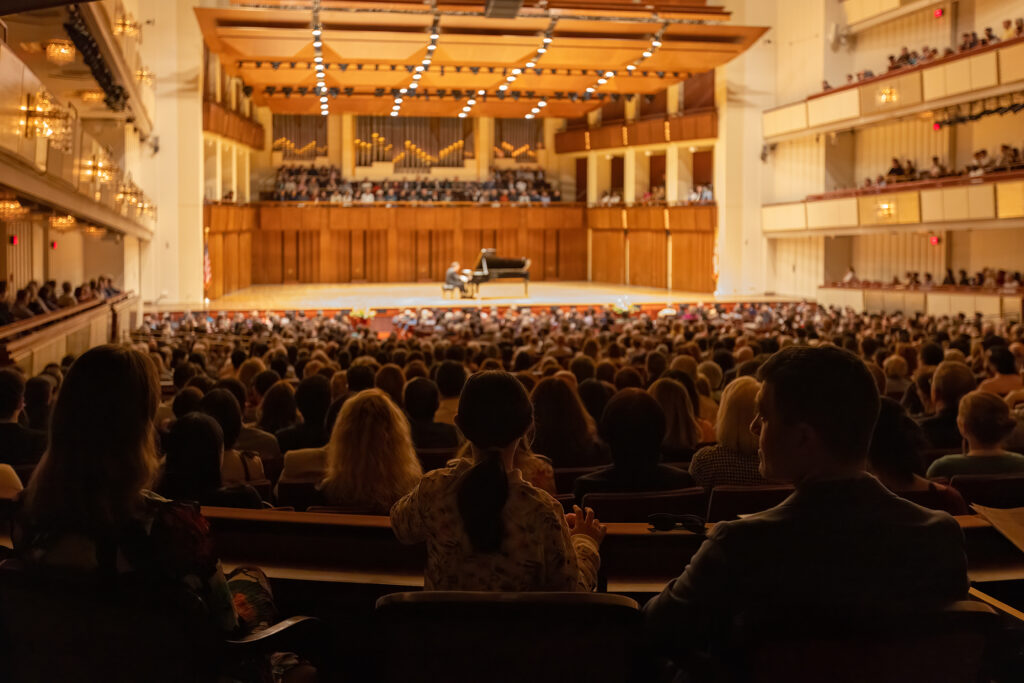
Become A Friend
Your support funds the wide-ranging artistic work that inspires, educates, and connects us.

